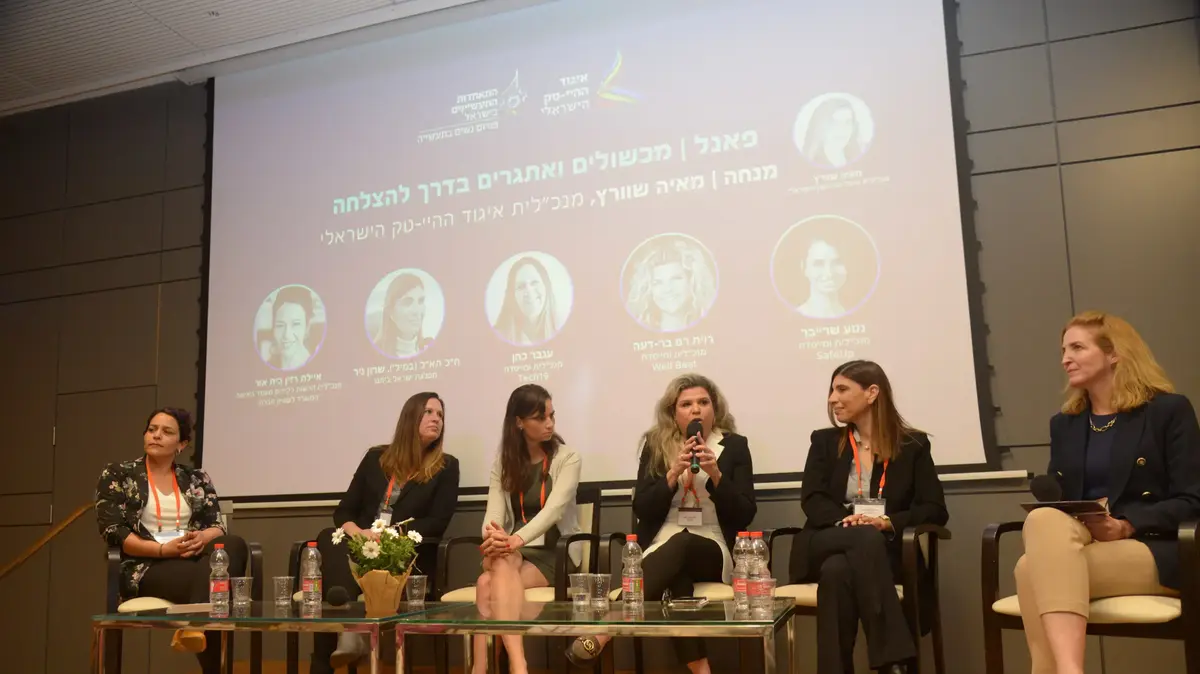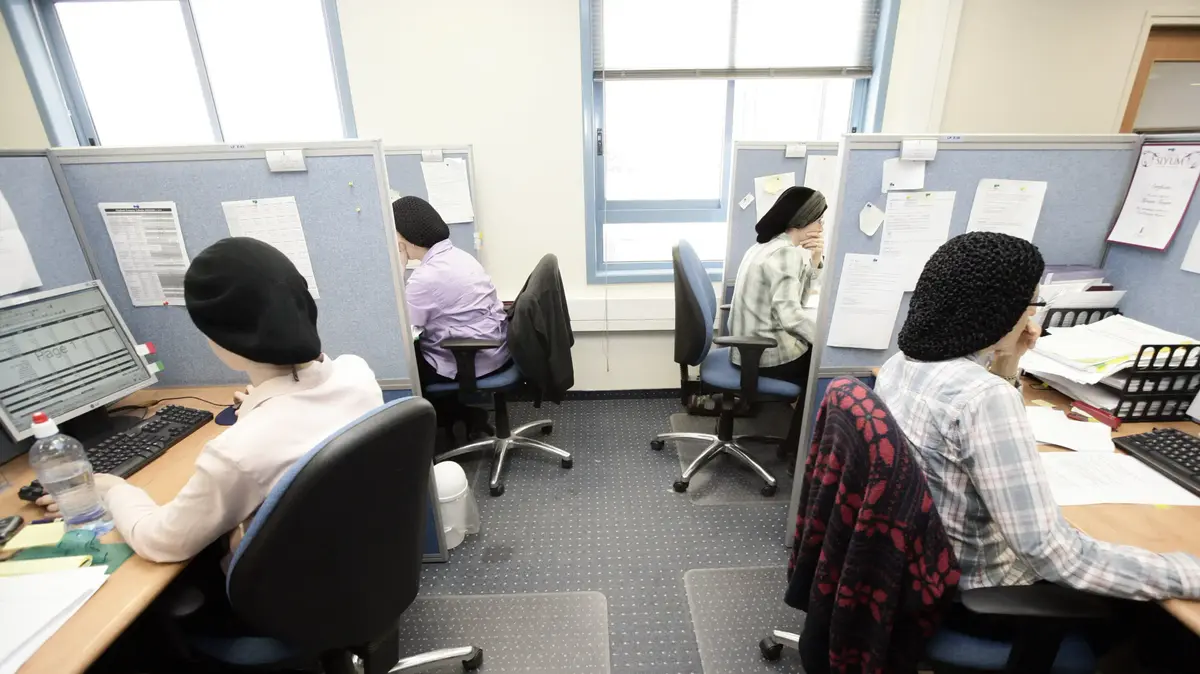Israeli high-tech: an equal opportunity for every child, or only for Ashkenazis from the center?
What influences most of all the chances of an Israeli child getting a job in the high-tech industry?
Why is education in Israel below the level of third world countries - and why has the fact that the achievements of students in Israel are lower than those of the Muslim world, already become an existential threat?
All the answers inside
Liat Ron
16/01/2022
Sunday, 16 January 2022, 08:14 Updated: 08:54
Share on Facebook
Share on WhatsApp
Share on Twitter
Share on Email
Share on general
Comments
Comments
I met Rizik last week at a veteran unicorn in Tel Aviv. He is a 33-year-old energetic automation developer from a small village in the north. Fantastic.
In his village there is no awareness of the high-tech world. Only three guys from the community went to study computers and the fact that as a child he came to a computer class in Nazareth, was accepted to an outstanding youth program and from there to the Technion, is no less wonderful.
Ren, 33, was lucky. Consciousness in his childhood neighborhood in Ashdod. His parents, recognizing that he was attracted to the technological field, bought a simple computer at home and he researched it in depth and learned to program on his own. He heads a development group at the Tel Aviv Unicorn.
We admire such extraordinary success stories, and like that of the kibbutznik from the north who rolled in no way to high-tech, or the moshavnik from the south who moved from the nightlife in Tel Aviv following a friend to a QA job, and joined a global company. But no one has any idea how many technologists promise we are missing out on the road because of education gaps, a failing education system, the socioeconomic situation at home and the geographical location.
The CBS data are empirically proven by what we all see around us: young people who grew up in well-established homes for educated parents in the center of the country, study for technology degrees (some after military service in a technology unit), integrate into high-tech, and their employment horizons are guaranteed.
In contrast, someone who grew up in the social or geographical periphery of a rainbow family, whose parents are uneducated, is doomed to stand on the other side of the unicorn fences, get drunk less, much less, and belong to what Rare Ackerman, the generic hitmaker of "Great Country," calls the "users" class. Those who use technology (and even that is not always the case), but do not work in it.
More on Walla!
Do not say "I do not have time": Winning tips for a healthy and amazing homemade dinner
Walla!
Food in collaboration will prepare
What did you study at university today, my high-tech kid? (Photo: ShutterStock)
CBS data: The road to high-tech passes through an established locality
The widening gaps between the rich of technology and the poor excluded from it, worries the experts greatly. Prof. Dan Ben-David, who heads the Shoresh Institute for Economic and Social Research at Tel Aviv University, claims that if they are not addressed quickly, there will be a catastrophe here. Dr. Tali Regev, senior lecturer at the Tiomkin School of Economics at Reichman University, agrees and warns , "The gap must be narrowed, because in a few decades the State of Israel will become a third world country.
" , States that the chances of young people who grew up in less established localities to integrate into the technology industries and earn high wages are low compared to those who grew up in established communities.
One-third of all undergraduate students in science and technology are from high socio-economic clusters and only one-fifth of them come from low clusters.
10% of those who belong to the high clusters study the high-tech professions, compared to only half, 5% of the students who come from low clusters.
The significant gap between the groups is segmented by type of matriculation certificate.
About half of those eligible for an increased matriculation certificate in science and mathematics, who lived in communities from high socio-economic clusters, pursued a bachelor’s degree in science and technology, compared with about a quarter of those eligible from low clusters.
And if that was not enough, the gaps in the psychometric test scores are not encouraging either: 17% of the examinees from a high socio-economic profile received a score above 700, compared to only 7% among examinees from low clusters.
Dr. Hani Zubida: "The gap in the second and third generations between people from the Eastern community and Ashkenazim is deepening" (Photo: Flash 90, Oliver Fitoussi)
Ashkenazis earn more
Prof. Yinon Cohen of Columbia University, led a study that examined the gaps in education and income in the second and third generation between Jews of Mizrahi, Ashkenazi and mixed descent based on Social Security data, among Israelis aged 25-43. The findings showed that the Ashkenazi advantage in higher education and income did not diminish in the third generation: more Ashkenazis studied in universities and earned more than those from the Eastern community.
The study also shows that income disparities from work, as an employee or self-employed, have not changed significantly in the transition between generations. The median income of Mizrahi men aged 30-43 who worked at least eight months a year ranged from 81% to 91% of the income of their Ashkenazi counterparts.
"Prof. Cohen and his colleagues found that the lower socioeconomic deciles, most of which are in the periphery, have color," says Dr. Hani Zubida, a lecturer in the Department of Political Science at Emek Yizrael Academic College.
How proud they were in Beit She'an of the first pilot to leave after 30 years, what a beauty, and it happened in 2021.
"One can continue to bury one's head in the sand and deny that state education has a huge range in education, and there is a huge gap "It is not for nothing that there are Mizrahi doctors in academia. The main discussion is that the education and the gap in the second and third generation between people from the Mizrahi community and Ashkenazim is deepening."
A huge gap between what is learned in the center and what is learned in the periphery, mainly because of supplementary education (Photo: ShutterStock)
Less origin and more level of education of the mother
Prof. Dan Ben-David does not agree with Dr. Zubida's ethnic determination. "We found the gap that the CBS is talking about, and it stems from the gaps in the level of learning in schools and high schools. The clear professions that affect future salaries are mathematics and English."
Mathematics leads to technological implications
"Mathematics is a language like English. It opens the doors to the labor market. It
surprised us that the number of children in the periphery, who study 4-5 units in mathematics, is similar to that in the center, but their level of education is lower. It is low and, accordingly, the entry into jobs that give high wages
. "
Did you also find a fit between ethnic origin and the gaps in education and income?
"Absolutely not. We relied on data collected for us by the CBS, on everyone born in Israel over a good few years, in a hundred different variables, including what they learned in school, parents' origin, religion, family size, what we can do to control and examine what contribution Each varies on future earning capacity.
"
The main thing that affects is the education of the parents, when the education of the mother is more important than that of the father - and this is true all over the world. The achievements of those whose mother did not graduate from high school will be 20% lower and those whose mother has an academic degree will be 20% higher
.
"These huge gaps are due to the fact that the education system here is poor and the state is unable to reduce them. Not only is the level here lower in knowledge, mathematics, science and reading, it is in a different league than the rest of the world."
"The role of the education system is to provide an opportunity, and that is our huge failure."
The main parameter for predicting earning capacity: the mother's level of education (Photo: ShutterStock)
Less interest from wealthy parents and more educated parents
Dr. Tali Regev notes the words of Prof. Josh Angrist, winner of the Nobel Prize in Economics in 2021, who stated that 10% of salary is equal to a year of high school. "And that is without talking about the quality of his learning," she says. Between the periphery and the center will come at the expense of the ability to get drunk. It is less a rich father and a rich child, unless the parents are educated, which predicts the education of the children and matches their future income.
"In Israel, primary education is free and higher education is also subsidized. Unlike in the United States, wealthy parents do not buy education for their children in private schools, except in special cases in the center, but educated parents pass on the importance of education to their children. I will say that the income of the parents has an impact on the resources of the local authority and they determine the level of education. "
In a rich local authority, which is in a higher socio-economic cluster, education will be of better quality.
"Absolutely. Through parental payments to the authority and the schools, and here there are very large gaps, despite the differential budget, according to which lower clusters receive a higher budget. There is a shortfall that is reflected in the Arab authorities, but not only in them. From a geographical and social periphery, with no home support and no education, the over-budgeting fails to help him.
"Ostensibly, there are the same schools and the same teachers, but what affects the quality of education is the added value that students receive.
"There are several programs for targeted intervention in Druze society that have been very successful and prove that with better teachers in the periphery, gaps can be reduced."
Intelligence Unit 8200: It is recommended to encourage diversity in recruitment to the technology units (Photo: IDF Spokesman)
What are the authorities doing?
Mostly do not cooperate
A report by the Knesset Research Institute, published late last year, summarizes the grim reality: If you are young from the socio-geographical periphery, your chances of integrating into Israeli high-tech are lower than those of a young person from a socio-economic status. The gaps begin in the education system, continue in higher education, and are reflected in the distribution into sectors of the economy and in earning capacity.
According to the report, high budgets and resources should be invested and education should be the key to success, as in the periphery parents and authorities can not afford to give children private lessons and enrichment outside school hours, and do not have the ability to repair the education system. And provide a broad and long-term envelope to the young people of the periphery.
Ahead of the Economics Committee meeting in late November, Bat-Chen Rotenberg, an economist at the Knesset Research Center, wrote recommendations for possible policy tools to reduce the gaps and increase the weight of high-tech employees in the socio-economic periphery.
On November 26, 2018, the Ministry of Economy launched the program "Putting the Periphery at the Center". To put it there, the incentive to open R&D centers from the Innovation Authority will be budgeted at a ridiculous sum of NIS 240 million, and at the end of the period specified in the plan, the companies can divide another NIS 100 million
. In 2019, 6% of high-tech projects in Israel were established in the north, in Haifa 7%, in the south 3% and in the center, a big surprise, 53%. By the way, according to the report, the Innovation Authority In the center "for some reason, and therefore did not act on it, and instead established" Route 15 ",Which did not rise and close.
According to the report, high budgets and resources must be invested and education concentrated on the key to success. In the periphery, parents and authorities cannot afford to give children private lessons and enrichment outside school hours, and do not have the ability to repair the education system. Wide and long-term for young people in the periphery. In
practice, of course, this did not happen. Encouraging the study of five units in mathematics, opening frameworks for vocational training, establishing incubators for technological entrepreneurship, increasing budgets for the study of high-tech subjects in schools, institutions of higher education and vocational training in the periphery.
In addition, it is advisable to encourage diversity in recruitment to technology units and expand the possibility of working from home and budget directly to high-tech companies in grants, or give tax benefits to investors and venture capital funds to invest in the periphery, to improve the dismal situation in 2019.
The conclusion of the report is unequivocal: high-tech widens the social and economic gaps in Israel, and in order to reduce them, emphasis must be placed on education.
Prof. Dan Ben-David: "Those who receive a third-world education will not be able to own a farm, maintain health, welfare and military systems" (Photo: Official website, Gal Ben-Dor, Wikipedia)
Existential risk to the State of Israel
"If all this does not happen, warns Prof. Dan Ben-David, it will be the end of the country."
About half of the children today receive a third world education.
Israel's average in mathematics, in the international 'Pisa' tests are not only below the Third World countries, they are below the nine Muslim countries.
This is not surprising when 22% are ultra-Orthodox, who are increasing in number, who do not study the material.
Those who receive a third world education will not be able to own an economy, maintain a health, welfare and military system.
Unlike other countries in the world, our risk is existential.
"Not only will there be huge gaps in education and income, our ability to defend ourselves will also be harmed, thus creating a danger to the existence of the State of Israel
."
Of money
Career and higher education
Tags
social gaps
Higher education
periphery
technology
Ashkenazim
Hi-Tech
8200









